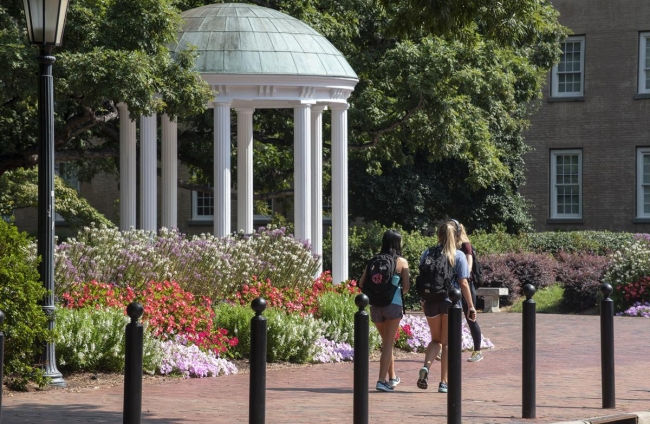You have /5 articles left.
Sign up for a free account or log in.

UNC Chapel Hill
Wikipedia
The University of North Carolina at Chapel Hill didn’t discriminate against white and Asian American applicants in admissions, a federal judge ruled last Monday.
The case was brought by Students for Fair Admissions, the same group that is suing Harvard University over its admissions policies. That case is currently awaiting a brief by the U.S. solicitor general before the Supreme Court decides whether to consider an appeal.
Judge Loretta C. Biggs found that "at trial, UNC defendants produced substantial, credible, and largely uncontested evidence that it has made the deliberate decision to pursue the educational benefits that flow from student body diversity; has offered a principled, reasoned explanation for this decision; and that the benefits the university seeks to achieve are sufficiently measurable to permit judicial scrutiny."
Specifically, Biggs said that "defendants detailed several ways in which UNC measures its progress towards achieving the educational benefits of diversity, both quantitatively and qualitatively." In part, the university collects data on all students and analyzes the data by race -- on enrollment and graduation rates, for instance.
Further, she said, "The educational benefits of diversity also are experienced and observed by university faculty, staff, students, and alumni across disciplines and professions."
She continued, “For example, Mary Cooper, a white alumna who served as student body president in 2011, averred that learning in a diverse student body prepared her to work with, coach, and teach others who do not look like her or who have not had the same experiences. Likewise, Peter Henry, a Black male alumnus from a wealthy Chicago suburb, observed that when he became study partners with a white male from rural North Carolina he learned a ‘real lesson’ about the ‘implicit assumptions’ he made about people.”
Then Judge Biggs turned to the way Chapel Hill admits students. “Based on credible testimony and other evidence … the court finds that: (a) The university uses a race conscious admissions program to enhance student diversity; (b) UNC’s admissions policies mandate that race is taken into consideration only as one of many ‘plus’ factors and that the weight of each factor is determined in the context of all of the information present in a student’s application; and, (c) UNC prohibits the use of race as a defining feature of any application, and its policies are flexible enough to allow the Admissions Office to assess all of the qualities of individual candidates. The court further finds that the university policies do not provide for the evaluation of candidates in separate admissions processes according to their race, nor have they established any procedures that mechanically award points -- or any consistent or predetermined weight -- to an applicant on the basis of race.”
Judge Biggs wrote of the training of application readers, “To that end, the Admissions Office ‘instruct[s] readers to consider each applicant as an individual based on all relevant factors revealed in his or her application in order to understand the candidate holistically and comprehensively,’” she wrote. “Race and ethnicity, therefore, must be considered ‘as one factor among many based on a holistic review of all circumstances relevant to an individual applicant.’ Further, readers are instructed that ‘there are no quotas, fixed points, or separate admissions processes based on a particular candidate’s race or ethnicity.’”
She also disputed the idea that the admissions system wasn’t monitored by UNC officials. She wrote that “senior members of the admissions leadership team testified credibly and without contradiction that they read hundreds of admission files every year to ensure that readers are engaging in holistic decisions.”
If the Supreme Court takes up the Harvard appeal, as it is expected to do, its ruling in that case would likely dictate the outcome of the UNC case as well.
UNC praised the ruling. “This decision makes clear the university’s holistic admissions approach is lawful,” said Beth Keith, associate vice chancellor for university communications. “We evaluate each student in a deliberate and thoughtful way, appreciating individual strengths, talents and contributions to a vibrant campus community where students from all backgrounds can excel and thrive.”
Genevieve Bonadies-Torres, a lawyer with the Educational Opportunities Project at the Lawyers’ Committee for Civil Rights Under Law, which represented Black and Latinx students in the case, said, “Race-conscious admissions policies are a proven tool that advance equal access to educational opportunities, and ensure our talented yet historically marginalized groups are not overlooked. As our clients demonstrated with their trial testimony and evidence, race is an integral part of a student’s identity, and must be treated as such during the admissions process. We need to expand on the progress we’ve made when it comes to diversity and inclusivity in the classroom, and we are elated that the court has concluded that UNC’s admissions policy is both necessary and lawful.”
But Students for Fair Admissions vowed to appeal.
Edward Blum, the president of SFFA, said, “Students for Fair Admissions is disappointed that the court has upheld UNC’s discriminatory admissions policies. We believe that the documents, emails, data analysis and depositions SFFA presented at trial compellingly revealed UNC’s systematic discrimination against nonminority applicants.”
Blum added, “SFFA will appeal this decision to the Fourth Court of Appeals and to the U.S. Supreme Court.”




